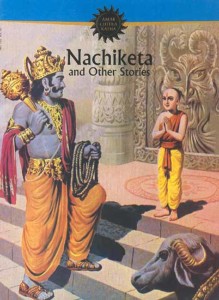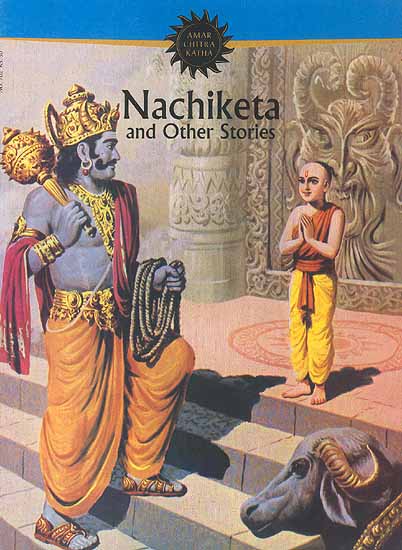As related in ‘Kathopanishad,’ there is a conversation between Nachiketa, a young boy, and Yama – the Lord of Death. The teacher is Yama – The Death Himself and the student is a boy in his teens.
In ancient India, there was Vajasrawas, a famous person. He was performing a sacrifice named Viswajeet Yajna. In this Yajna, the performer had to give away all his wealth. Cows were designated as valuable and special possessions in those very ancient days, and hence Vajashrava decided to donate all his cows to Brahmins.
Nachiketa was observing the sacrificial ritual with innocent interest. He was surprised to notice that his father was giving away only old and disabled cows. These cows had given their milk for a long time and who were not capable of bearing calves.
This ‘worldly cleverness’ of his father brought a change in the heart of the young boy.
Nachiketa, in order to dissuade his father from giving old cows, asked,” O father, whom have you decided to give me away?” The purpose of the boy was to stop his father to do such things.
At first his father did not take any notice of this ‘childish’ question, but Nachiketa was insistent. He repeated the question thrice when the irritated father said,” Nachiketa, I give you to the God Death.”
Nachiketa decided to obey the words of his father by going to the abode of Yama. After some initial questions, Nachiketa wanted to learn the mystery of what comes after death.
Yama was reluctant to answer this question. He said that this had been a mystery even to the gods. He asked Nachiketa to ask for some other boon, and offered many material gains.
But Nachiketa argues that all worldly treasures and heavenly pleasures come to an end sooner or later. If not day after, after hundred years. These are not permanent means of enjoyment. He insists to get the ultimate knowledge of Self.
Yama is pleased with such a young truth-seeker who had rejected the path of enjoyment and chose the path of goodness. Then Yama taught him the knowledge of the Atman, realizing which man attains immortality. Know the Self as Lord of the chariot, the body as the chariot itself, the discriminating intellect as charioteer, and the mind as reins.
The senses, say the wise, are the horses; Selfish desires are the roads they travel. When the Self is confused with the body, mind, and senses, they point out, he seems to enjoy pleasure and suffer sorrow.
The all-knowing Self was never born, nor will it die. Beyond cause and effect, This Self is eternal. When the body dies, the Self does not die.
One must discriminate the Soul from the body, which is the seat of desire. After death, it is the Soul that remains; the Soul is immortal.
Thus having learned the wisdom of the Brahman from Yama, Nachiketa was freed from the cycle of births.







